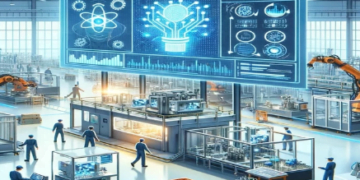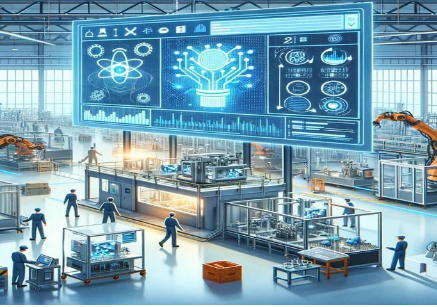DBT Bureau
Pune, 14 July 2024
According to SkyQuest, the global Artificial Intelligence (AI) in Manufacturing Market was valued at USD 2.58 Billion in 2022 and is projected to increase from USD 3.20 Billion in 2023 to USD 64.63 Billion by 2031, reflecting a compound annual growth rate (CAGR) of 45.6% during the forecast period from 2024 to 2031.
Artificial intelligence helps boost factory productivity and efficiency in manufacturing industry and is therefore getting adopted at a rapid pace. The objective of optimizing manufacturing processes and the increasing adoption of Industry 4.0 is driving the demand for AI in manufacturing. The global market for AI in manufacturing is categorized by components, technology, applications, end-users, and regions.
Artificial Intelligence (AI) In Manufacturing Market Overview:
| Report Coverage | Details |
| Market Revenue in 2023 | $ 3.20 Billion |
| Estimated Value by 2031 | $ 64.63 Billion |
| Growth Rate | Poised to grow at a CAGR of 45.6% |
| Forecast Period | 2024–2031 |
| Forecast Units | Value (USD Billion) |
| Report Coverage | Revenue Forecast, Competitive Landscape, Growth Factors, and Trends |
| Segments Covered | Component, Device Type and End User |
| Geographies Covered | North America, Europe, Asia Pacific, Middle East & Africa, Latin America |
| Report Highlights | Development of new AI in manufacturing hardware and software solutions remains prime focus of companies |
| Key Market Opportunities | Demand for predictive maintenance slated to create new business scope |
| Key Market Drivers | Computer vision and machine learning technologies to improve automation capabilities drive market growth |
Segments covered in Artificial Intelligence (AI) In Manufacturing Market are as follows:
- Component
- Network, Module
- Device Type
- Wearables, Tracker, Smart Lighting, Smart Parking, Alarm & Detector, Others
- End-User
- Automotive Industry, Infrastructure, Healthcare, Manufacturing Industry, Others
Hardware Plays a Vital Role in Adoption of Artificial Intelligence (AI) in Manufacturing
Legacy infrastructure and systems of manufacturing facilities are not compatible with advanced artificial intelligence technology thereby driving the demand for novel hardware solutions. This sub-segment covers components such as sensors, devices, processors, integrated circuits, etc. designed especially for AI in manufacturing going forward. The need for better computing power and demand for faster hardware configurations will also help this segment bolster artificial intelligence (AI) in manufacturing market growth in the future.
Software plays a crucial role in incorporating advancements of AI technology in artificial intelligence (AI) in manufacturing applications. High investments in the development of novel AI software solutions and integration of edge and cloud computing are also creating new opportunities for artificial intelligence (AI) in manufacturing providers going forward.
Machine Learning in AI Applications for Manufacturing will help Promote Growth
Machine learning algorithms help to examine extensive datasets for providing immediate insights into manufacturing equipment and processes. Such insights help players improve their market position by optimizing operations and utilizing resources. Predictive maintenance is also largely enabled by the deployment of machine learning algorithms. High investments in machine learning technology development are also expected to alter the global artificial intelligence (AI) in manufacturing market growth trajectory vastly in the future.
Computer vision technology is projected to witness robust demand over the coming years. The growing need for automation across all kinds of manufacturing facilities is slated to create an opportune setting for artificial intelligence (AI) in manufacturing companies going forward. This technology helps machines to interpret and process visual data to make informed decisions in real time that enhance the productivity of manufacturing operations.
Predictive Maintenance Takes Crown When It Comes to AI Application in Manufacturing Space
Downtime is the worst nightmare of any manufacturing operation, and this is why predictive maintenance is the best companion for any manufacturing company. A growing number of manufacturing facilities deploying predictive maintenance solutions to reduce downtime allow this segment to lead global artificial intelligence (AI) in manufacturing adoption. Meanwhile, the use of AI for quality control and inspection of finished goods is also expected to rise at a robust CAGR over the coming years. Use of AI for production planning also offers lucrative opportunities for artificial intelligence (AI) in manufacturing providers in the long run.
Artificial intelligence (AI) in the manufacturing market is slated to largely benefit from the predictive maintenance sub-segment across the forecast period. Upcoming artificial intelligence (AI) in manufacturing companies should target the services sub-segment and established providers should focus on the hardware sub-segment to get the best returns in the long run. Context awareness and natural language processing technologies have a lot of untapped potential for artificial intelligence (AI) in manufacturing companies to experiment with.





















